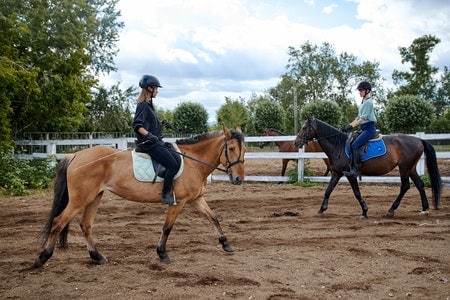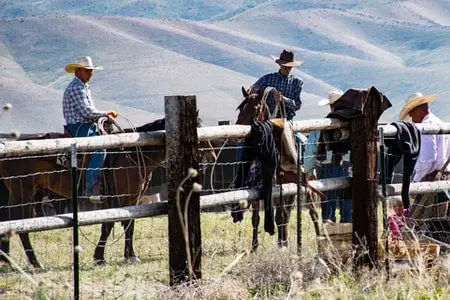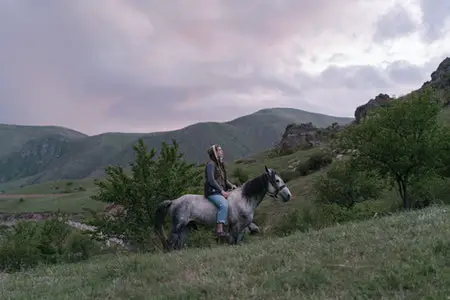The American Horses’ Council (AHC) 2005 economic study “dispelled the misperception that the horse industry is an enterprise only for wealthy individuals”. The cost of a horse depends on the type of horse you desire to own, its age, it’s capacity to be ridden, and how good it is in racing.
You gain profit if you are purchasing a horse for public use e.g. beach rental horse owners earn a fair amount. When looking at the price of a horse, there are many factors you need to also consider knowing well that a horse could cost a lot or nothing. If you plan on buying your first horse, you will need to place your budget in the range of $1,500 to $3,000 to purchase it.
Having enough funds before buying a horse allows you to have multiple choices to select from. The purchase of an imported horse could be expensive since they are mostly used for competitions because of their bloodline.
A well-trained horse could cost more due to the amount of feeding and training it has undergone therefore, it is very important to know the right vendor to purchase a horse from. There are two ways to purchase a horse, either directly from a person or through an auction and both have advantages and disadvantages.

Auctions may allow for a more accurate estimation of market value because of the number of onsite comparisons of the price while purchasing from a person directly may allow for more consultation from the seller as you get to inquire more about the horse and can determine if the horse is good for the purpose you desire to use it for.
Researching the availability of horses and price is advisable hence, the purchasing method, conditions of sale, and guarantee should be clearly defined. Below is a list of expenses you need to budget for when considering the cost of a horse.
- Feeding Expense: People think since horses eat mostly grass their feeding won’t cost much with the mindset that grasses could be found anywhere but do not forget that to maintain a healthy horse it requires proper feeding. A healthy 1,000-pound horse will need to eat a minimum of 1.5% to 2.5% of its body weight each day in feed and hay. The cost of hay changes monthly as there are supplemental and pre-packaged feeds. The cost of upkeep might affect the price of a horse in the sense that poor hay and feed determine the size of horses for sale but the price of a horse for meat slaughter comes at a low price depending on the type of horse you intend to buy. The high price of horses reflects the time and money put into it.
- Health Expense: Managing the health of a horse could be expensive because health issues may arise, for instance, horse hooves could grow if a horse doesn’t have active movement, it can develop a collapsed heel which may contribute to arthritis and will need regular dental care because that helps maximize nutrient use to maintain body condition hence, a monthly health checkup of a horse is required.

- Training: Training a horse could be challenging, you will have to first establish good communication between you and your horse. You also need to understand its body language and in return, it gets familiar with your presence. When training a horse, get ready to deal with difficult issues in the process; patience, perseverance, and good experience are required also. You will need to create an all-round enclosure that works best so that your horse can practice going in circles. A halter is required, most halters are made of wide leather or nylon straps but nylon straps are more effective for training your house so as not to lean against pressure. A saddle is also required, it must fit both you and the horse with a training surcingle that straps around the horse’s chest.
- Land Space: Housing a horse requires a large land space to enable you to build your stable to keep them. Boarding facilities are available for those who do not have personal space but desire to own a horse (2). The merit of a boarding facility includes the availability of a riding arena and access to adjacent trails which will always allow your horse to mix up with other horses. How and where the horse care is provided will have a large impact on the need for equipment and facilities that will also affect the daily operation costs such as feeding and veterinary care.
- Maintenance: If you are housing a horse in your property, there are maintenance costs required to make sure everything is well catered for and are functional. Maintenance of the horse’s stable and equipment. Its bedding should be maintained to its comfort.
- Equipment: Wishing to own a horse also requires you to have the right equipment to maintain the horse and the cost of new equipment could be expensive depending on your funds. Equipment to own includes a halter, a saddle, the tack, the comb, soft and hard brushes, hoof pick, surcingle, rider’s clothes (helmet, breeches, jeans, jodhpurs, boots, gloves, belts). As a horse owner, you are meant to own a truck that will enable you to move the horse freely.
- Utilities: These are related utilities, including water, heating, and electricity of dedicated buildings to shelter the horses.
- Bedding: There are differences in bedding costs and commonly used types are wood shavings. Cleaning routines, amount of time horses are confined in the bedding area and drainage characteristics of the flooring will affect the amount of bedding needed.

- Manure: Everything that enters the mouth of a horse comes out as manure in its faeces and the manure could be sold. So, when considering buying a horse, you should also have potential manure buyers. This will help you make money and prevent environmental pollution.
- Trimming: A horse’s feet grow continuously and so if unshed naturally, it will require regular trimming. They need trimming every 8 to 10 weeks in winter and every 6 to 8 weeks in summer (1).
- Medical Supplies: It is necessary to purchase medical products when considering buying a horse. These include vet thermometer, Synflex cohesive bandage, conforming stretch gauze bag, vet wrap, bandage, wonder dust, gloves, underwoods horse medicine, cotton roll, staple removal, forceps, scissors, and deworming is advised to be done yearly.
- Budgeting Expense: Owners should familiarize themselves with the costs of horse ownership before purchasing as it is good to maximize the net benefits from horse ownership. The costs will vary because of the varsity of horse uses and the ways horses are managed. Among other factors, costs of ownership per horse will vary because of the expected range of expenses for similar items and services therefore, owning more than one horse reduces costs because of the shared facility. Expenses could be divided into operating inputs and ownership costs; operating inputs involve day to day and mostly cash expenses while ownership costs involve owning a horse and equipment, they also include insurance and taxes.
- Insurance: Insurance is important to acquire when buying a horse in case of illness or accident that can be costly (3). Insurance should be able to cover the vet’s fee and maintenance which depends fully on the insurance company. The cost of insurance can become expensive over an extended period if not obtained on time.
After considering the above you can then decide if you are capable of owning a horse or not. If you decide to still purchase a horse, then you need to know the steps that can help you achieve that.

Factors To Consider Before Paying For A Horse
-
The type of horse you want to buy
Before you purchase a horse, you need to have in mind the particular type of horse you want. Set a requirement the horse is meant to meet and consider that the type of horse will determine the cost and expenses you would have to incur. Research on good horse vendors online or from friends.
-
The fitness of the horse
Never pay for a horse you have not seen, make sure the horse is up to the standard you are looking for. If possible, go with an experienced person (a vet) if you are not good at identifying a fit horse. Make sure the horse is suitable to ride and visa versa.
-
The history of the horse
Request for the genetics of the horse you want to buy and check its medical records to know the health history of the horse. Request for records of originality because some will sell horses that have been doped due to behavioral problems. If the horse has been successful in the past but is being sold cheaply, find out the reasons for that.
The Refund Agreement
Make sure there is a formalized return agreement if the horse is unsuitable. Often refund agreement will be to exchange the horse with others hence, ensure you are comfortable with the terms and conditions are written in the agreement and make sure it is a legal purchase to avoid fraud.
Sources:
1.) Pet Ponder
2.) The Horse
3.)Equine World

